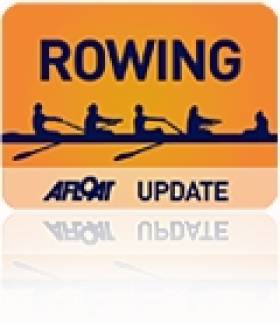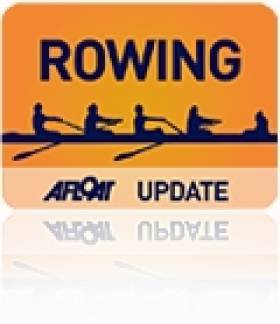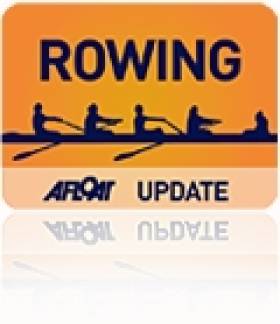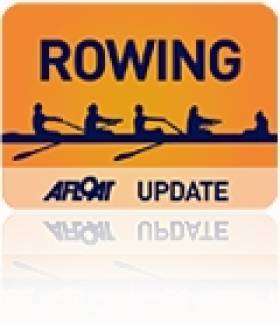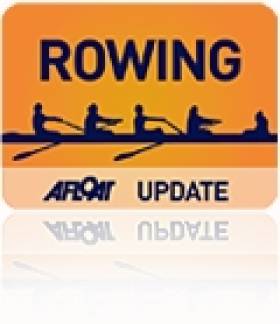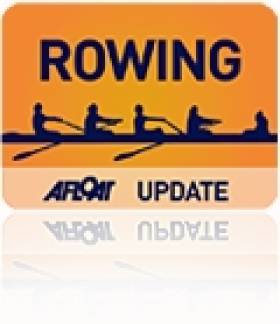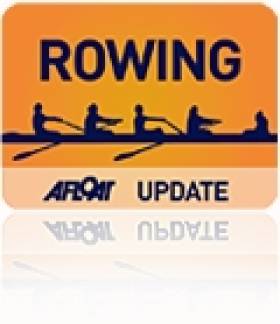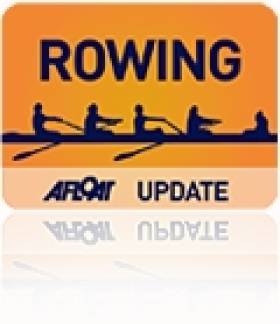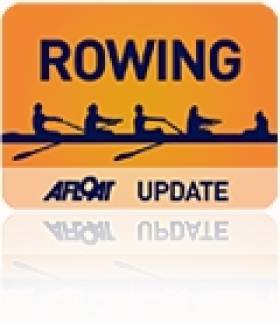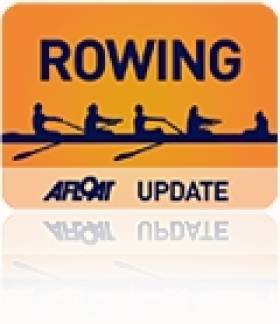Displaying items by tag: O'Donovan
Morris and Hayes Fourth at World University Rowing
#ROWING: The Ireland lightweight women’s double scull finished fourth at the World University Games in Gravelines in France today. Poland and Britain comfortably took the gold and silver medals, while Ruth Morris and Orla Hayes pressurised Mexico, who held third. However, the Mexicans held on to take bronze.
The men’s lightweight double of Shane O’Driscoll and Gary O’Donovan took sixth in their A Final.
World University Championships, Gravelines, France (Irish interest; selected results)
Men
Lightweight Double Sculls – A Final: 1 Britain 6:49.95, 2 Hungary 6:51.19, 3 France 6:54.01; 6 Ireland 7:06.62.
Single Sculls – B Final (Places 7 to 12): 3 Ireland (Hughes) 7:19.25.
Lightweight Single Sculls - B Final (Places 7 to 12): 3 Ireland (Beck) 7:29.08.
Women
Four – B Final (Places 7 to 10): 3 Ireland 7:27.46.
Lightweight Double Sculls – A Final: 1 Poland 7:43.43, 2 Britain 7:44.49, 3 Mexico 7:52.01; 4 Ireland 7:55.00.
Lightweight Single Sculls – B Final (Places 7 to 10): 4 Ireland (Dolan) 8:26.36.
Ireland A Finalists at World University Rowing Championships
#ROWING: Two Ireland crews will compete in A Finals at the World University Rowing Championships in Gravelines in France. Ireland’s lightweight double scull of Gary O’Donovan and Shane O’Driscoll finished third in their semi-final today out of an unfavourable lane two in difficult conditions. The women’s lightweight double of Ruth Morris and Orla Hayes also qualified for the A Final, winning their repechage. The three other Ireland crews will compete in B Finals tomorrow.
World University Championships, Gravelines, France. Day Two (Irish interest; selected results)
Men
Lightweight Double Sculls – Semi-Final Two (Three to A Final; rest to B Final): 1 Britain 7:11.03, 2 Germany 7:13.41, 3 Ireland (G O’Donovan, S O’Driscoll) 7:24.64.
Single Sculls – Repechage One (First Two to A Final; rest to B Final): 4 (T Hughes) 7:57.06.
Lightweight Single Sculls – Repechage Two (First Three to A/B Semi-Final; rest to C Final): 3 Ireland (C Beck) 8:15.18. Semi-Final One (Three to A Final; rest to B Final): 5 Beck 8:18.31.
Women
Four – Repechage (First Two to A Final; rest to B Final): 6 Ireland (N Long, O Finnegan, G Collins, S Dineen) 7:51.42.
Lightweight Double Sculls – Repechage One (First Two to A Final; rest to B Final): 1 Ireland (R Morris, O Hayes) 7:45.17, 2 Canada 7:46.81.
Lightweight Single Sculls – Repechage One (First Two to A Final; rest to B Final); 6 Ireland (Sinéad Dolan) 8:37.95.
Tenth Places for Two Ireland Crews at World Rowing Championships
#ROWING: Ireland’s men’s lightweight pair finished fourth in their B Final, 10th overall, at the World Rowing Championships in Amsterdam today. China won in a fast time in tailwind conditions, with Bulgaria and the Netherlands battling each other and finishing second and third. Ireland’s Niall Kenny and Mark O’Donovan were fifth through the middle stages but won their own battle with Austria to take a clear fourth.
The women’s four of Marie O'Neill, Emily Tormey, Aifric Keogh and Barbara O'Brien were fourth in their B Final, behind the Netherlands, who won impressively from Italy, with Germany third.
World Rowing Championships, Amsterdam, Day Six (Irish interest, selected results)
Men
Lightweight Pair – B Final (Places 7 to 12): 1 China (Zhenwei Hou, Fangbing Zhang) 6:28.29, 2 Bulgaria 6:30.40, 3 Netherlands 6:31.01, 4 Ireland (M O’Donovan, N Kenny) 6:34.06, 5 Austria 6:37.65, 6 Chile 6:43.01.
Women
Four – B Final (Places 7 to 10): 1 Netherlands 6:28.95, 2 Italy 6:35.51, 3 Germany 6:37.90, 4 Ireland (M O’Neill, E Tormey, A Keogh, B O’Brien) 6:43.62.
Lightweight Double Sculls – C Final (Places 13 to 18): 1 Russia (D Stepochkina, O Arkadova) 6:58.21, 2 Ireland (C Lambe, D Walsh) 7:00.11, 3 Denmark 7:03.49, 4 Switzerland 7:03.51, 5 Belarus 7:09.08, 6 Greece 7:14.20.
O'Donovan Accelerates Into A Final at World Rowing Championships
#ROWING: Paul O’Donovan gave Ireland its first A Final place at the World Rowing Championships in Amsterdam today with a stirring performance which yielded second place in the lightweight single sculls semi-final. The UCD man lagged the field in the early stages; he was sixth at 500 metres as Zhao Jingbin of China and Marcello Miani of Italy commanded the race. By halfway O’Donovan was marginally in third place, but still over three seconds behind the leaders. As Miani moved clear in the final 1,000 metres, O’Donovan chased down and passed the Chinese. In a close finish, O’Donovan and Perry Ward of Australia took second and third, with Zhao Jingbin pushed into fourth and the B Final.
The Ireland lightweight men’s pair of Mark O’Donovan and Niall Kenny finished sixth in their semi-final and must settle for a B Final place. This was an exciting and fast race where all the boats were in with a chance of qualification until the very final stages, Switzerland, France and Australia took the A Final spots.
World Rowing Championships, Day Five (Irish interest; selected results)
Men
Lightweight Pair – A/B Semi-Final One (First Three to A Final; rest to B Final): 1 Switzerland (S Niepmann, L Tramer) 6:38.67, 2 France (A Mouterde, T Baroukh) 6:41.22, 3 Australia (A Foot, D Purcell) 6:42.39; 4 Bulgaria 6:44.00, 5 Netherlands 6:45.00, 6 Ireland (M O’Donovan, N Kenny) 6:46.60.
Lightweight Single Scull – A/B Semi-Final One (First Three to A Final; rest to B Final): 1 Italy (M Miani) 7:02.00, 2 Ireland (P O’Donovan) 7:03.59, 3 Australia (P Ward) 7:04.10; 4 China 7:04.99, 5 Denmark 7:08.21, 6 Hungary 7:15.08.
Women
Pair – A/B Semi-Final Two (First Three to A Final; rest to B Final): 1 United States (M Kalmoe, K Simmonds) 7:16.35, 2 New Zealand (L Trappitt, R Scown) 7:22.12, 3 Australia (C Sutherland, L Stephan) 7:30.02; 4 Serbia 7:34.92, 5 Ireland (L Kennedy, L Dilleen) 7:35.18, 6 Czech Republic 7:45.68.
Lightweight Double Sculls - C/D Semi-Final (First Three to C Final; rest to D Final): 1 Denmark 7:25.98, 2 Ireland (C Lambe, D Walsh) 7:26.35, 3 Russia 7:26.65; 4 Argentina 7:27.24.
O'Donovan's Second-Half Speed Secures World Rowing Semi-Final Place
#ROWING: Paul O’Donovan put in a brilliant second 1,000 metres to secure a semi-final place in the lightweight single sculls at the World Rowing Championships in Amsterdam today. O’Donovan needed to finish in the top three of the quarter-final to progress, but he was was fifth at half way, over one-and-a-half seconds behind third-placed Steffen Jensen of Denmark, with Russia’s Alexandr Tufanyuk fighting it out with Lars Hartig of Germany at the head of the field. O’Donovan turned it on in the second half. As the Russian faded, the Irishman took over in third behind Hartig and Jensen, and then passed the Dane to take second – just over a second behind Hartig.
In a major shock, the World Under-23 champion, Andrew Campbell Jr of the United States, made his exit when he fell out of the boat in the immediately preceding heat.
World Rowing Championships, Day Four (Selected Results; Irish interest)
Men
Lightweight Single Sculls – Quarter-Final (First Three to A/B Semi-Finals; rest to C/D Semi-Finals): 1 Germany (L Hartig) 7:13.67, 2 Ireland (P O’Donovan) 7:14.76, 3 Denmark (S Jensen) 7:33.91; 4 Azerbaijan 7:25.84, 5 Russia 7:33.91, 6 Algeria 7:43.76.
Superb Win For Kenny and O'Donovan over World Rowing Champions
#ROWING: The Ireland lightweight pair of Niall Kenny and Mark O’Donovan caused a major upset on the second day of the World Rowing Championships in Amsterdam today. The new crew at international level won their heat, beating World and European champions Switzerland. The Swiss set a blistering early pace and drew well clear, but the Irish had by far the better second 1,000 metres. They caught and passed the Swiss, who could not meet the challenge and actually stopped before getting going again, allowing China to take the second qualification spot.
World Rowing Championships, Amsterdam, Day Two (Selected Results, Irish interest)
Men
Lightweight Pair – Heat Two (First Two to A/B Semi-Finals; rest to Repechage): 1 Ireland (M O’Donovan, N Kenny) 6:53.54, 2 China (Zhenwei Hou, Fanbing Zhang) 6:54.57; 3 Switzerland 7:03.74, 4 Australia 7:10.31, 5 Bulgaria 7:13.05, 6 Austria 7:19.39.
O'Donovan Qualifies for World Championships Quarter-Final
#ROWING: Paul O’Donovan gave Ireland a good start to the World Rowing Championships in Amsterdam today. The UCD lightweight single sculler qualified directly for the quarter-finals by finishing third in a heat, with four going through. China’s Zhao Jingbin set the early pace and O’Donovan was in fifth to halfway. But the Chinese faded while O’Donovan grew stronger: the Irishman passed him and Lukas Babac of Slovakia in the second half of the race. Pedro Fraga of Portugal won, with Perry Ward of Australia second.
World Rowing Championships, Amsterdam (Selected Results; Irish interest)
Men
Lightweight Single Sculls – Heat Two (First Four Directly to Quarter-Finals; rest to Repechage): 1 Portugal (P Fraga) 6:53.62, Australia (P Ward) 6:54.96, 3 Ireland (P O’Donovan) 6:57.65,4 China (Jingbin Zhao) 7:03.13; 5 Slovakia 7:04.81, 6 Quatar 9:52.93.
O'Donovan Just Misses Out on Medal at World Under-23 Rowing
#ROWING: Paul O’Donovan finished fourth in the A Final of the lightweight single sculls at the World Under-23 Rowing Championships this morning at Varese in Italy. The winner was never in doubt from early on as Andrew Campbell of the United States made his exit from this grade by disappearing from the field and taking his second successive gold medal. Behind him Enes Kusku of Turkey continued his good form in the Championships by taking silver. The surprise came from Francesco Pegoraro of Italy, who took over in third in the third quarter. O’Donovan challenged but could not pass him.
World Under-23 Rowing Championships – Finals (Selected Results; Irish interest)
Men
Lightweight Double Sculls – B Final (Places 7 to 12): 1 Ukraine 6:30.20, 2 Greece 6:33.06, 3 New Zealand 6:34.23, 4 Ireland (G O’Donovan, S O’Driscoll) 6:34.72, 5 United States 6:37.39, 6 Serbia 6:42.16.
Lightweight Single Sculls – A Final: 1 United States (A Campbell Jr) 6:54.49, 2 Turkey (E Kusku) 7:00.14, 3 Italy (F Pegoraro) 7:00.58; 4 Ireland (P O’Donovan) 7:02.32, 5 Hungary 7:02.68, 6 Belgium 7:09.71
O'Donovan Sprints Into Final at World Under-23 Rowing
#ROWING: Paul O’Donovan produced an excellent finish to take second in his semi-final of the lightweight single scculls at the World Under-23 Rowing Championships in Varese in Italy today. Enes Kusku of Turkey set a hot pace and won, while behind him O’Donovan had to see off a number of challengers to secure the top-three spot. He was third at 1500 metres, but passed Francesco Genoraro of Italy coming up to the line and almost caught Kusku.
World Under-23 Rowing Championships, Varese, Italy (Selected results; Irish interest)
Men
Four – B Final (Places 7 to 12): 1 Croatia 6:09.17, 2 Belarus 6:10.60
3 China 6:11.76, 4 Serbia 6:14.24, 5 France 6:15.88, 6 Ireland (R Bennett, K Neville, F McQuillan-Tolan, R O’Callaghan) 6:20.33.
Lightweight Single Sculls – Semi-Final One (First Three to A Final; rest to B Final): 1 Turkey (E Kusku) 7:11.73, 2 Ireland (P O’Donovan) 7:11.91, 3 Italy (F Pegoraro) 7:12.30; 4 Netherlands 7:15.25, 5 Germany 7:17.22, 6 Greece 7:29.74.
O'Donovan's Third Place Sends Him To Under-23 Rowing Semis
#ROWING: Paul O’Donovan moved into the semi-finals of the World Under-23 Rowing Championships in Varese in Italy by taking third place in his quarter-final this morning. Enes Kusku of Turkey and Daniel Matyasovszki of Hungary took off at pace early on and annexed first and second, while the UCD lightweight single sculler took it easier and held on to the last qualification place despite a late challenge from Grigor Manchev of Bulgaria.
World Under-23 Rowing Championships, Varese, Italy (Irish interest; selected results)
Men
Lightweight Single Sculls – Quarter-Final One (First Three to A/B Semi-Finals; Rest to C/D Semi-Finals): 1 Turkey (E Kusku) 7:10.73, 2 Hungary (D Matyasovszki) 7:12.03, Ireland (P O’Donovan) 7:22.19; 4 Bulgaria 7:27.25, 5 Slovakia 7:35.37, 6 Slovenia 8:03.76.
Women
Lightweight Single Sculls – Repechage One (First Two to A/B Semi-Finals; Rest to C/D Semi-Finals): 1 New Zealand 8:00.05, 2 Germany 8:04,34; Ireland (D Walsh) Did Not Finish


























